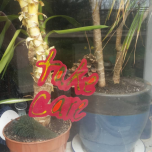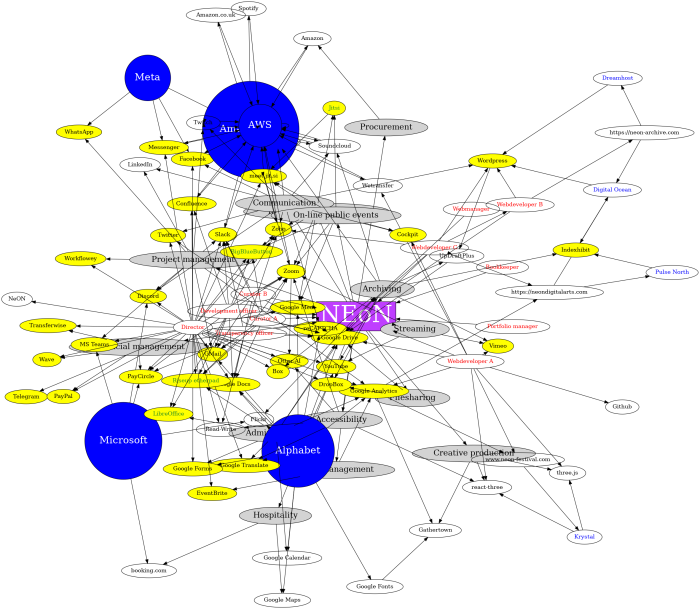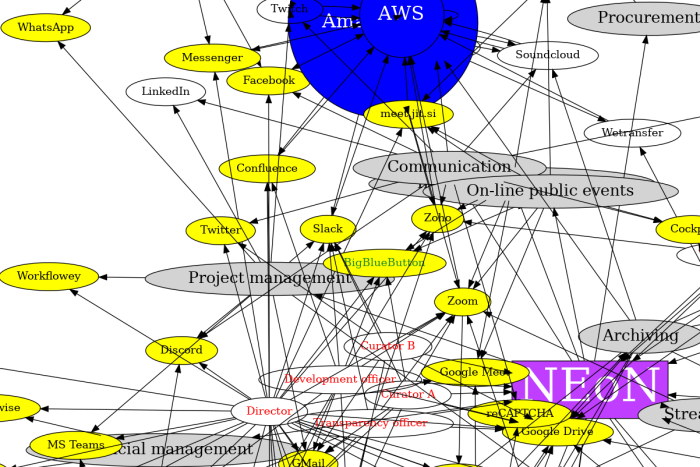Counter Cloud Action Plan
NEoN Trans*Feminist Counter Cloud Action Plan
→ [Counter_Cloud_Action_Plan Plain text version]
YEAR 1-5 (2022-2027)
The Trans*Feminist Counter Cloud Action Plan will take place at irregular moments yet with continuing commitment in Dundee between 2022-2027. The plan exists to take care of descent and dissent from the cloud, whilst partying in the ruins of Big Tech depletion. The plan offers ways to get the most from a hyperscaledown to learn about slow feminist and queer server practices including storage, videoconferencing, collaborative working, low-power graphics, and related practices within the field of (digital) arts practices and community organising. The activities gathered in the Trans*Feminist Counter Cloud Action Plan are:
- transgenerational and accessible
- proliferate interecosytemic transcorporeal infrastructural scenarios
- fuel imaginations of deinvestments
- in support of detanglings and decontaminations
The plan is organized around intense experiences yet designed to avoid burnout. Everyone who signs up makes a commitment to computational sustainability, community maintenance and collective transformations. The programme benefits counter-infrastructure-makers, as well as the imaginaries of local operators who interact with servers and institutional processes. For background on the Counter Cloud Action Plan (CCAP), please consult NEoN Digital Audit: recommendations for trans*feminist countercloudactions.
Digital Depletion Strike
On the 8th of March each year, as part of the international trans*feminist strike, NEoN calls for a counter cloud action day, asking institutions, their partners, audience, funders and supporters to make an effort to withhold from using any cloudbased applications for that day. To make this strike possible, participating institutions may embark on temporary counter cloud support for institutional operations such as local networks for collaborative authoring, community banking facilities, message boards or shadow IT. NEoN will commission Sergina to compose and write a strike song (the song or performance will with multiple cloud alternatives). At 5:55am (sunrise) there is a procession from the picket line to the highest point in the city looking over Dundee, where the creative director of the organisation together with Sergina will perform the song commissioned for the strike:
In the ruins of Big Tech Depletions
Imaginations of Deinvestments, Detanglings and Decontaminations
Transgenerational, Interecosytemic Transcoporeal Scenarios
The consumption of clouds
A banal endemic form of violence
as the background condition of everyday life
the right to question
Resisting cloud dependency as inevitable
The Background conditions
underbelly feels
Imagining, decontaminating
 After the picket line descends into the city, chanting:
After the picket line descends into the city, chanting:
"No solutions!"
"imagination is free habibi"
"cloud abolition!"
"less ethics more politics!"
"big tech strikethrough"
"pocketpower!"
"hey hey ho ho, these hungry clouds have got to go"
"BACK UP Back up! Back up! We want our freedom, freedom!"
"All these applications, we don’t need ‘em, need ‘em!"
"Back up! Back up! We want our freedom, freedom!"
"We don't need no digital transformation"
"We don't need life to access control"
"We don't need no digital transformation"
"Pull your data from the cloud, we don’t need ‘em, need ‘em!"
On-line visits: Hotspotting together in the Big Tech ruins
Throughout the year, NEoN organises hotspot tours for engaged audience members (hotspotters) through other types of setups. During the hotspot tours, hotspotters compare notes with other orgs that attempt to live together in the contamination of big tech ruins. How do each of the organisations live there with paradoxes, leakages, contradictions in contemporary computation? How are orgs working in counter ways, rendering different power relations, different end-games ?
The tours last two hours each and take audiences through server login screens and back-ends, spreadsheets and databases. They will look at how orgs deal with the banalities, ambiguities and playful negotiations of these alternatives: solidary infrastructure, minimal viable computing, small web, digital discomfort. Tour guides will include cloud depletion drag queens, queer service teams and e-waster sculptors––who will host the hotspotters as they experiment with social and political opinions, sustaining indeterminacy and making local resistance.
- From London, New York: Other Weapons
- From Rotterdam: Cristina Cochior, Manetta Berends (Varia)
- From Washington, D.C: Shiloh Krupar (Hotspotter's Report)
- From Brussels: Elodie Mugrefya, Martino Morandi, (Constant)
- From Brussels: Peggy Pierrot, Laurence Rassel (erg)
- From Sweden: Miranda Moss (Regenerative Energy Communities)
- From ......: ...... (......)
- From ......: ...... (......)
Vacancy: trans*feminist sys-admin
Full Job Description
NEoN is looking for a trans*feminist sys-admin who understands that computational infrastructure is more-than the tools or applications. One of the many things we are looking for in a sys-admin is that they can live (with us) in the ruins of Big Tech. This will be a collaborative, slow paced position, and you will be providing and will be provided with support of all kinds. The good-enough candidate should be curious about Free, Libre and Open Source software, low-power technologies, repairable tools, solidarity infrastructures; and averse to exploitation and extraction of clouds. We offer a co-defined meandering path in money and responsibility.
The Position
The trans*feminist sys-admin interrelates artistic experimentation with internal technological infrastructure from within a non-hierarchical team, providing structure, performing workarounds and just good enough solutions at a high level. Working with artists, audiences and colleagues they keep with the complexities of root causes and other deep-time technical issues. This role will also contribute to continual transformation of processes and standards that work towards the reduction of greenwashing, against any incentives to consume more compute instead of less. Ability to scope complex server imaginations and network infrastructure practices. Qualified candidates MUST have the desire to commit to a programme of countercloudactions - possibility to work under a pseudonym of your choice. Has the ability to listen to and think with comrades and co-workers on both technical and non-technical issues.
Need to Have:
- Life Experience – 4 years in an activist or artistic setting and preferably 2 years in an environment full of queer operations.
- Self-Education – Self-taught knowledge is preferred over formal education; reducing harm by the toxic, ableist, and oppressive expectations embedded in extractive business models and engineering training programs. Courses in Slow software development, Digital Discomfort Management or similar are appreciated.
- Confidence to refuse gadgetization, pocket power and measuring everything.
Skills and Experience needed:
Support for Free, Libre and Open Source related technologies
- automated back ups on USB-sticks
- calendar
- etherpad
- gitlab
- Home Brew Server
- jitsi
- Low energy graphics
- mailman
- minimal viable computing
- nextcloud
- QOS
- Slow and ultra-slow server services
- Solar powered websites
- S/PLINT
- Vernacular Language Toolkit
- wiki-to-pdf
Localization support
- PMware
- HyperP
Support of local access solutions
- PPN
- Desktop Presence
- PresentApp
HR Information:
- 28 days paid holiday per year
- 1 day a week infrastructure dreaming space
- accessible working conditions
- caring environment for complicated bodies, caring for kin, and facing ongoing experiences of trauma and oppression
- support for contributing to the collective struggle
- mentorship, support, and affirmation — and as a reminder that our wholeness matters and liberation is possible.
- Salary negotiable with experience, needs and desires
A trans*feminist sys-admin tries really hard not to apologize for not being available.
Schedule:
- Full-time role, Monday through Thursday
- 10 am to 8 pm shifts
- Enjoy 3 day weekends every week
Cloud Dream session to save us from the void
With Jackie Wang (regularly), in close collaboration with Cassandra Troyan and various agents from A Traversal Network of Feminist Servers.
From the blistering seat of an overwhelming perspective, call the infrastructural catastrophe back from storming and suffering itself onto others (community, friends, the future), by counting and recounting in the most irreproachably NEoN vocabulary, dreams, translations of dreams, which are as reclamations of logic and improvements of life, scenarios, that manifest as an alternative method of survival.
countercloudconductscohort
The countercloudconductscohort is a year-long mutual mentorship for cloud users who are beginning or revisioning their practice. Combining reality-based, capacity-conscious consultation, mentorship will focus on ways that cloud-users can be nurtured by computing otherwise, while avoiding burnout, and commit to sustainable infrastructures, collective maintenance and living in the ruins. Participants in the countercloudconductscohort work together towards a de-investment in agile-optimized-solutionist technologies.
Participation in the countercloudconductscohort will include monthly:
- Articulations: migrate your core and soar
- Activations: descent/dissent from the cloud
- Imaginations: get the most from the hyperscaledown
Participants will also gain access to:
- an intimate, supportive cohort of similarly situated colleagues and mentors
- lifetime access to a focused listserv and shared resources
- alums of the cohort will be eligible for additional Trans*Feminist Counter Cloud Action training and opportunities for paid work as a Trans*Feminist sys-admin.
Participants are asked to make a yearlong commitment, with 10 months of active participation (with a summer break in August and a winter break in December) which includes 2.5h of mutual consultation, additional preparation time, on a voluntary basis.
Feminist tech maintenance training
Lead by Other Weapons and R-urban hubs activist Doina Petrescu, together with the newly appointed trans*feminist sysadmin, this training is for those that want to engage in long term maintenance and otherwise upkeeping of trans*feminist infrastructures. Sessions focus on:
- Feminist Community Economies
- Infrastructure handovers
- Durational commitment building
- Slow server maintenance
- Expectation management
- Institutions beyond survival
It is advised that the training should be combined with a course in Digital Discomfort Management and provides dreamy possibilities and offers its help to readily identify competent countercloudconductors in participant communities. Operators will receive training in tactical ethical organising for computational infrastructure. Upon fulfillment, operators and institutions are granted the descentfromthecloud Professional Certification credentials.
Stickers
Embellish your on- and offline channels with this energizing set of stickers (spring 2022 edition).
Digital Discomfort Management
This course will let participants develop skills for dealing with seamful, low-fi and just-enough technologies and negotiating guiltless conduct in any tech-demanding environment. The course involves suspending all cloud dependencies for an increasing amount of time between first two people and then extending to different groups, ages and stakeholders. The productive insecurity developed in this course will provide openings that help understand the complex interaction between computational skills, tools and matter. These intense sessions are lead by experienced experts such as Magda Tyżlik-Carver, Elodie Mugrefya or Jara Rocha. Participants are provided with a copy of "A catalog of formats for digital discomfort... and other ways to resist totalitarian zoomification".
Infrastructural gatherings
Once a month, all persons involved in maintaining, developing, using or providing digital infrastructure for NEoN will gather in a comfortable location for an afternoon of exchange, plotting and planning while being provided with plenty of delicious food and drinks. Each time, conversations will be losely prepared by a different person. Notetaking tasks rotate. At least one page from a text selected from the readinglist below will be read aloud. Trans*feminist sys-admins in refuge/residency are more than welcome to join.
Infrables: un-fixing bug reports as a solidary praxis
Infrables make negative use-cases and un-fixing bug reports as a solidary praxis. They are articulations of what extractive digital infrastructures are, and what they are doing. What infrables can we tell to take-down Big Tech narratives and undo their violences? Generated through narrative and extra-narrative accounts, infrables identify oppressive infrastructures or tools, but they also make space for other technological attitudes. Find examples and exercises here.
Yearly workshop: Slogans for the Digital Depletion Strike
As part of their collaborations with the ongoing countercloudaction with NEoN, poet Harry Josephine Giles in collaboration with the NEoN Sys-Admin will facilitate a protest banner-making workshop, during which participants learn how to make their own protest banners from wherever they like. This workshop includes discussions about the depletion of community resources by Big Tech infrastructure, struggling for survival, the privilege to protest and the way protest expresses an ability to imagine otherwise.
Banner-making materials needed for the workshop will be provided to participants at no cost and delivered by the NEoN cargo bike directly to each participant.
Slogans for the Digital Depletion Strike will be held via the jitsi instance installed on NEoN's server, with locally sourced automated captions (see: slow software development).
Transnational trans*feminist sys-admin refuge
NEoN invites groups of experienced and less experienced trans*feminist sysadmins from all over for a week of recovery and refuge. The refuge is an occasion for exchanging, replenishing and rest.
- From Barcelona: Anarchaserver (Calafou)
- From Brussels: Domainepublic and NUBO
- From Brazil: Fernanda Monteiro (Vedetas)
- From London: Rise-up
- From FR/NL/PT: Aymeric Mansoux (LURK)
- From ......: ...... (......)
- From ......: ...... (......)
Slow software development
NEoN starts the development of a captioning service that can run locally on a user’s machine. The software makes use of collaboratively trained libraries.
Audiences are invited to come pick up their update, bring your usb stick and have a cup of tea.
Impossible/possible de-install Party
Schedule a moment together. Set a deadline. De/recontaminate.
#Installlinux
#Erasefacebook
#Degooglify
#DigitalDetox
#Decloudify
#DigitalRetox
Self-Study Stack
The self-study stack is a way to develop a framework for thinking about the role of tech in the daily operations of an organisation and the impact of Big Tech on the possibilities and imaginaries for life.
- Marloes de Valk, Refusing the burden of computation: edge computing and sustainable ICT
- Dependency on software giants jeopardises academic freedom
- Jara Rocha, A catalog of formats for digital discomfort... and other ways to resist totalitarian zoomification.
- Other weapons, What have you given up to technology in the name of safety? How has this affected you?
- Loren Britton & Helen Pritchard, For CS
- Alexis Pauline Gumbs, From the Lab Notebooks of the Last* Experiments in M Archive: After the End of the World
- Femke Snelting, Infrastructural Solidarity
- Solar Low-Tech Magazine
- Femke Snelting, A fish can’t judge the water
- Gwen Barnard, Naomi Alizah Cohen Notes Towards an Antifascist Infrastructural Analysis
- Shiloh R. Krupar, Hot Spotters Report
- TITiPi, The extractive infrastructures of contact tracing apps
- R-URBAN
- adrienne maree brown, Emergent Strategy: Shaping Change, Changing Worlds
- Varia, Networks of one's own
- Angela Piccini and Kate Rich, RADMIN Reader
NEoN Digital Audit: recommendations for trans*feminist countercloudactions
How could a digital practice become more ethical? And what does it mean to say “Digitally Ethical”? In response to these questions, TITiPI [1] interrogated NEoN's daily computational operations with a view to enabling the organisation to imagine other environmental and "just" digital practices.
Background
In 2021 TITiPI received an email from Donna Holford-Lovell:
“I am director of NEoN, a small digital arts charity based in Dundee, and I am re-looking at how our organisation functions, its purpose and all those big questions that our current situation has accentuated. I would like to do an ethical audit of NEoNs digital use and digital working practices. Produce a digital manifesto of sorts - I don’t buy Nestle but I use google and I need to do something about it :) I am hoping you may have some ideas on how to move forward on this. I would be particularly interested in working with a female/non-binary artists/technologist/hacker (not sure of what title is best to use). It will form part of our new approach to working/programming etc but also part of this years theme 'Wired Women’."
Donna's invitation was generous and open, inviting TITiPI to perform an audit that did not need to stay within the realms of an existing structure––an audit as artwork, a proposal for a set of practices around digital ethics. However, the culture of audits can easily slip into measuring everything and suggestions for mitigating damages: audits are often representational, aimed at the reduction of harm and rarely lead to structural changes or paradigm shifts for institutions and organisations. Instead, TITiPI wanted to structurally contribute to the work of NEoN. We wanted the audit to be a plan for how to take positive meaningful action as an organisation––as part of a rethinking of the internal policies and values for digital infrastructure which could be more responsive to, and supportive of, diverse grassroots artists, groups and communities. We shared some of our own experiences with decisions made around digital infrastructure that demonstrate that the digital tools and systems organisations use for their day-to-day running operations matter and frame the possibilities for creativity and politics. We spoke about working together with the sex worker organise's group Other Weapons, who shifted their use of google docs to using etherpads hosted by Constant. We discussed the privacy issues with using automated transcription or captioning when working with groups organising with refugees. We explained how small cultural and educational organisations such as Varia, Infrastructural Manouevres or erg are trying to develop and maintain digital infrastructures at their own scale.
The position of TITiPI is that computational infrastructure is more-than the tools or applications that organisations use to keep operations going. They form the background conditions and affective underbelly which shape the temporal, political and creative possibilities, attachments and practices for organisations in significant and worldmaking ways. Our approach to the audit was therefore to identify what these background conditions are for NEoN, how they were shaping their digital ethics and what practical scaled advice might be useful.
Observations
The process started from eight hour-long conversations with different people involved in creating, maintaining, funding and using the NEoN digital infrastructure plus several feedback sessions with NEoN's creative director. We traced the background and underbelly of NEoNs computational infrastructure, why people were attached to particular applications, storage solutions or social media, what they made possible or not, the feelings and uses, the shared or different values around them. A second set of conversations attempted to open up the imaginaries of what a flourishing computational infrastructure might be, as part of NEoNs aims to make possible diverse approaches to life, living and digital art practice. TITiPI recorded these conversations in notes and a diagram that mapped relations between organisational operations and applications, between people using these applications, and between the applications and Big Tech (Amazon, Google, Microsoft).
- Yellow background: Tools and platforms with a NEoN account
- Red: Individuals using and/or maintaining digital tools
- Green: Free, Libre and/or Open Source; self-hosted
- Grey background: Operations
- Blue: Cloud providers
- Blue background: Hyperscale cloud providers
Throughout that process it became clear how NEoN is using many different applications and services simultaneously, as a way to stay with the needs of their employees, audiences and funders. This cluster of dependencies that is also shown in the diagram, is felt by workers at the core of the organisation to be at the same time overwhelming, out of control and complex, yet integral to the functioning of the organisation. How would we ever detangle? What also emerged as a reoccurring theme in the conversations, is that there seems to be a hard separation between how NEoN imagines the potential of reimagining and remaking with computational infrastructure, versus reimagining and remaking with their artistic programme. Beyond discomfort with the general overwhelming effect of the amount of channels, applications and dependencies on Big Computational Infrastructure, it was felt by many interlocutors that the cluster creates problems in terms of privacy (internally it is not entirely clear who has access to what applications; some of the services deployed have bad track records in terms of privacy); in keeping work and private life reasonably separate (many of the applications in use are accessed through mobile platforms which means that work messages are hard to separate from private messages; personal accounts are used alongside work accounts; applications themselves actively blur lines between professional and private communication); in being resource hungry (both in terms of intensive computing, carbon/mineral resources and demanding human attention); often not Open Source (this means that they cannot be locally maintained, installed, changed or even inspected); serviced by cloud companies (this model of software service is based on creating increasing dependency, while feeding into the speculative financial schemes of hyperscale companies). While being committed to digital ethics, NEoN struggles to articulate the impact of their dependency on Big Tech for many if not all of the core operations of its organisation, beyond scaling back or replacing one tool by yet another.
We noticed that while NEoN is a Digital Arts organisation and has a long history of radical arts programming, there is not an established culture of discussing its own technological choices, nor a specific internal policy or set of values that the organisation follows when it comes to tools and infrastructure. The fact that most tech work done within in NEoN is commisioned to freelance workers, may well have contributed to this. The absence of a set of practices around computational infrastructure also might explain why imaginations for NEoN's infrastructure beyond the offerings of Big Tech are almost completely missing from the conversations.
The intense entanglement of NEoN's operations with many different "free" services, and lack of imagination for how else to relate to technological-institutional practice, is not a unique picture, it looks very familiar for many organisations and institutions nowadays. The pattern of extraction and expansion that we see at work at NEoN is linked to set of technologies which we call "cloud computing", and almost all applications deployed by NEoN at the moment fall under that category. Cloud computing works to gain monopolies over computational infrastructure through its particular understanding of efficiency and optimisation (which is always about doing things faster, smoother), consumption, financialisaton, capitalisation, forced blurring of public and private, atomization of tasks into micro-services.
Cloud-computing is computation optimized for mobility and growth; it proposes to rent, and purposely not-own “compute”. This invites a continuous stream of startups to flexibilize their computational needs and rapidly deploy new services in turn: Software as a Service (SaaS), Platforms as a Service (PaaS), Infrastructure as a Service (IaaS), anything-as-a-Service (XaaS). The abundant cloudified offer is hard to refuse, especially for underfunded organisations such as NEoN. The technological complexity of day-to-day activities is increasing, and their dependency on digital services inescapable. By moving event-management, file sharing, video conferencing, business analytics, paying on-line, communication and creative production to the cloud, organizations such as NEoN on the one hand do not need to pay for the development of their own tools, or invest in their own infrastructure, but at the same time they become locked-in to the extractive modes that cloud services propagate.
The model proposed by Big Tech is to win a monopoly over services and operations of any kind. Once it gains control, it actively deplete organisations' knowledge, confidence and even interest in technology itself. The interests of hyperscale companies gathered under GAFAM/GAMA[2], BATX[3], FA(A)NG[4], MAMAA[5] etc. are tied to the interests of their billionaire shareholders. This is worrisome because these are publicly registered corporations with shareholders that are in it for earning more money all the time. Extractive Capitalism For Beginners: To pay out dividends and shares, a publicly registered company needs to grow. If not, it loses its competitive edge, its market value and the ability to negotiate access to scarce resources (energy, clean water, land, carbon, precious metals). This is why Big Tech expands into new territories all the time, why they drag institutions, cities and sometimes whole states into handing over their core operations (libraries, pension payments, education, healthcare), breaking workers unions and coercing users into neverending updates of their software and devices, expecting more and faster services for doing increasingly banal things. Think about why pseudo-intelligent techniques such as Machine Learning are now being tacked onto almost anything, how resource hungry cryptocurrencies quickly normalized, why smartphones replace installable PCs or how agility (just-on-time!) became a prerequisite for everything. These are not inevitable consequences of technological advancement. They are each technologies and practices that drive a need for more compute, and never less. It seems almost too simple, but the fact that the interests of Big Tech are tied to speculation, means that they "need" to accumulate ever more extreme amounts of power and money. Big Tech can only go Bigger.
Through our contact with NEoN and its practices we realised more than ever how much Computational Infrastructure offered by means of cloud computing is contrary to trans*feminist ethics. Cloud computing not only depletes institutional skills, personal data, human resources, and imagination, but actively contributes to the increase in global energy consumption and needs always more resources for more chips, more server racks and more powerful devices to interface with more of it. Even if Big Tech and cloud computing might offer "zero carbon" solutions to organisations, their zero carbon accounting is based on a reduced model of sustainability. Their disproportionate financial capacity give them the power to buy up huge areas of land previously used by agriculture for solar farms, or buy up forests to use for carbon sinks, displacing local people, food supplies, flora and fauna and industries––this model is neither ethical nor sustainable. Big Tech grows by outsourcing the damages of its cynical games to the planet, to crumbling public institutions and to the pockets of precarious end-users who are expected to clean up the mess. It is therefore no accident that cloud companies won't operate in countries that give rights to unions, close access to financial technologies for sexworker organisers (Paypal) and deplatform political activists (Zoom), or fire antiracist activists (Google).
Recommendations
What would it mean for NEoN to build a tactical ethical response through computational infrastructure in the same way they do through their artistic programme? How would this allow NEoN to reimagine their own tangled computational infrastructure?
Instead of making recommendations based on an audit of NEoNs' digital tools and services (which would run the risk of adding the complexity of cloud dependency by just replacing one digital tool with another), The Counter Cloud Action Plan proposes a set of speculative recommendations to energise NEoNs' imaginaries and collective values for computational infrastructure. The speculative programme imagines the next few years as a training ground for NEoN to collaborate on articulating a set of practice and values, activating culture, and imagining realities and fantasies of tactical digital ethics for the organisation. The aim of the training ground for tactical digital ethics is for NEoN to collectively define their position on digital infrastructure for themselves and others. To become a reference for neighbouring grassroots organisations, and to develop tools as an organisation to advise other arts organisations and community groups on forming the choices they make in relation to their tactical digital ethics. The programme aims to infuse and challenge what a digitally ethical practice or tactical ethical response for NEoN could be.
The Counter Cloud Action Plan is not a recipe, but a provocation for NEoN to:
- invest in a long term reanchoring of infrastructural imaginations, for example by interrelating outward artistic experimentation with internal technological infrastructure
- develop a vision on digital ethics proper to its commitment as a feminist organisation
- work towards articulating a position which recognises greenwashing, incentives to contribute to more compute instead of less, ... for what they are
- develop internal policies for technology choices in line with the organisations' vision, for example in the form of a public commitment
Colophon
This Counter Cloud Action plan is dreamed up by TITiPI. None of the mentioned guests, workshopleaders, trainers, collaborators has been confirmed so far.
- Thank you: Ailie, Ashley, Bilyana, Bibi, Beatrix, Donna, Martino, Rick, Rifke, Sabrina, Stuart.
- Tools: wiki-to-pdf, graphviz, BigBlueButton, etherpad
- Fonts: Asul, Compagnon, PicNic
- Images: Gifted and lifted from TITiPI Stickers, Other Weapons, Ren Britton, Queering Damage, Miranda Moss, Malé Luján Escalante, Tobias, Dick Reckard, Underground Division.
- Copyleft TITiPI and NEoN. All materials available under the Collective Conditions for Re-Use (CC4R) 1.0. You may copy, distribute and modify them according to the terms of the CC4R: https://constantvzw.org/wefts/cc4r.en.html
- ↑ TITiPI is a trans-practice gathering of activists, artists, engineers and theorists initiated by Miriyam Aouragh, Seda Gürses, Helen Pritchard and Femke Snelting. Together they convene communities to hold computational infrastructures to account and to create spaces for articulating what technologies in the “public interest” might be when “public interest” is always in the making. They develop tools from feminisms, queer theory, computation, intersectionality, anti-coloniality, disability studies, historical materialism and artistic practice to generate currently inexistent vocabularies, imaginaries and methodologies.
- ↑ Google, Facebook, Amazon, Microsoft or Google, Meta, Amazon, Microsoft
- ↑ Baidu, Alibaba, Tencent, and Xiaomi
- ↑ Facebook, Amazon, (Apple), Netflix, and Alphabet/Google
- ↑ Meta, Apple, Microsoft, Amazon, and Google’s parent company Alphabet








